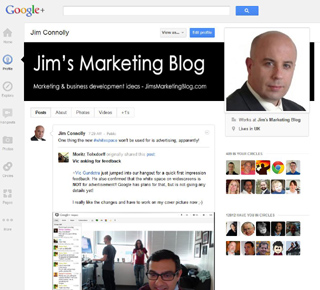How do you feel about ‘change’?
Yesterday, Google released an all new look for it’s Google+ project and the reaction from users is exactly what we see, whenever any major change is made to any major project:
 Some people embraced the change and quickly adapted their Google+ account to get the best from it. For instance, I changed my cover photo. If you’d like to connect with me on Google+, click here.
Some people embraced the change and quickly adapted their Google+ account to get the best from it. For instance, I changed my cover photo. If you’d like to connect with me on Google+, click here.- Some people were just happy to see Google continue to innovate, rather than allow the project to become stale.
- Some people hated it (their words). They either hated the change because of the way it looked or the way it worked (the UI User Interface.)
- Others just said they hated it and were leaving the service.
Every person has the right to express what they thought of the new Google+ design and some of that feedback will be acted on to make the Google+ experience better. You usually learn more about how to improve a product from so-called negative feedback, than you do from fans saying they love it.
Change is everywhere and constant
The thing is, we need to learn how to deal with change, because whether we like it or not, the world around us is in a constant state of flux. Everything changes all the time.
Not that long ago:
- Google didn’t even exist.
- Myspace was massively bigger than Facebook.
- The global banking system was seen as reliable.
- And until the launch of Apple’s iPad, the market for tablet devices was believed to be dead.
The set of your sail
In our businesses and our lives in general, it pays to keep an open mind regarding the changes around us. It has often been said that what determines our success and happiness is less about what life throws at us, but more how we respond. My mentor, Jim Rohn, used to say it was all about the way we set our sail and in my experience, Jim was right.
Your marketplace is changing. Your competitors are changing. The needs of your clients are changing too. If you want to remain relevant, let alone thrive, it’s better to adjust the set of your sail, than to hope that things just stay the same.